Turbulent times ahead for the cabinet?
- Published
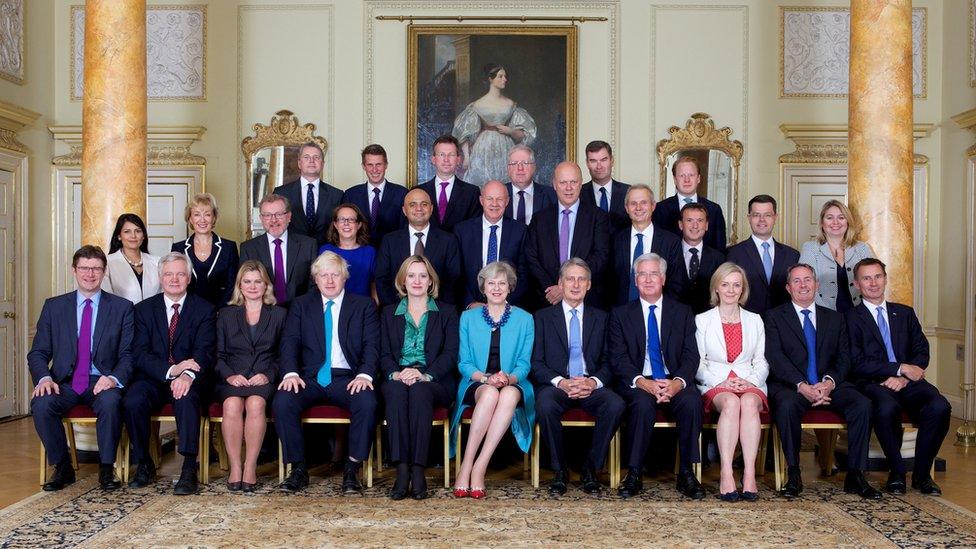
Top marks to Theresa May for pulling off the trick of appearing, for three months at least, briskly self-confident and robustly in charge.
Now it is starting to get difficult.
If she was seen initially as the new Iron Lady,, external her feet may prove to be made of flimsy tin.
Heathrow exposes the new reality. The government has finally made a decision, long delayed because of internal party opposition. The compromise is that disarray becomes the new unity.
Cabinet ministers can vigorously campaign against it for at least a year. The foreign secretary will do so and there's been one resignation which will force a by-election.
Remember, the government has a majority of a slender, but not so sweet, 16., external
While ministers have in the past been allowed leeway on matters of conscience - moral issues that touch on faith and deeply held ethical positions - I can't recall it ever being allowed over a key economic decision. Oh, apart from leaving the European Union.
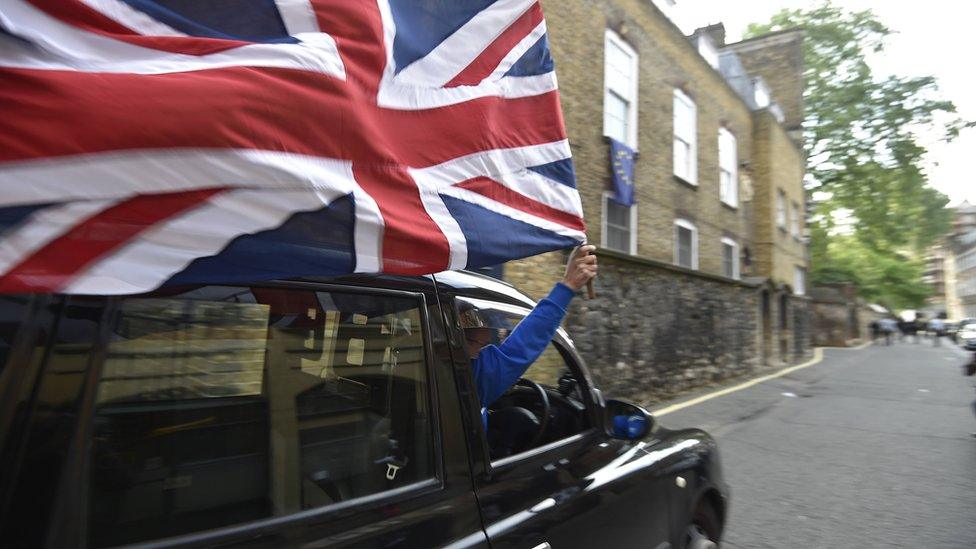
The EU referendum result has changed the way the cabinet is managed
And of course it all goes back to that referendum.
Like Mr Cameron's decision to allow a free-for-all, Mrs May's dispensation to her cabinet springs not from an innate sense of liberalism, but the hard reality of party management.
He could not enforce discipline on a huge issue that split his party and the country. She cannot manage it over a third runway for London. They allow 100 flowers to bloom because they lack the authority necessary for vigorous weeding.
Underneath the current prime minister's determined sense of purpose, her repeated insistence on respecting the will of the British people, there is perhaps a sense of insecurity. Certainly, beneath the surface rolls a chaotic uncertainty and tensions which flow from the nature of her rise to power.
This does not mean she will not pull it off, but her task is much less certain, much more daunting, than many cheerleaders wish to acknowledge, or the polls suggest.
Brexit blew apart not only the government but its world view. The personal drama of the Palace of Westminster coup helped disguise the profundity of the ideological revolution.
Out went Cameron and Osborne and with them a certain brand of conservatism.
The importance of this has been smothered because it doesn't fit old labels. It's not wet v dry, left v right, not even Leave v Remain. It is amorphous, hard to define. The new government and the old one, which people voted for, both claim the mantle of One Nation Conservatism., external But the way they see that nation is very different.
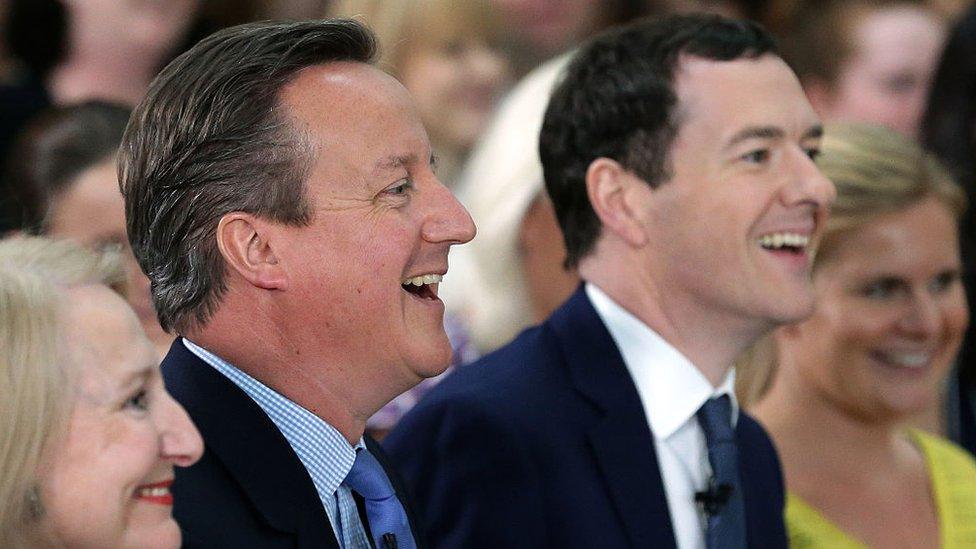
Cameron and Osborne's brand of Conservatism differs from that of Mrs May
It is easy to point to policy differences -. over the Northern Powerhouse, China and grammar schools but it is harder to get to the heart of what distinguishes Mrs May's conservatism from Mr Cameron's.
In essence it is about an economically and a metropolitan socially-relaxed liberalism, the old ruling elite in open-necked shirts and chinos, versus a more authoritarian, petit bourgeois populism which believes in a bigger economic role for the guiding hand of the State.
It is a firm rejection of the views of 48% of voters - who have been told, in effect, that they do not matter and should shut up. Mrs May is desperate to deliver a broad message from the referendum - and, not surprisingly, she finds that the loud shout of 52% of voters was an echo of her own deeply held beliefs.
Opinion polls suggest the voters agree - the results of the Witney by-election do not. People on social media have suggested if Labour's majority had been cut by a similar amount we would never hear the end of the threat to Mr Corbyn. Mrs May is not subjected to such pressure - yet.
In revolutions, heads roll, because it is dangerous to leave your opponents alive. But Mrs May's expulsion of George Osborne from the cabinet and the exiling of most of his allies falls short of political execution. They have not gone away, you know.

A proposed third runway at Heathrow highlights differences of opinion within the cabinet
Mr Osborne spent years spreading tendrils throughout the Conservative Party. Removing his patronage and power does not rip them out overnight. The master tactician has suffered a devastating defeat but that does not make him a fool - he is still one of the cleverest people in politics, sinuous and determined.
These tensions over the direction of the party and the country are very real, for all that there is no neat way of describing them. That they are also bound up with personal pique and thwarted ambition, make them very dangerous for a government with such a slender majority.
But you can't get away from it. The most dangerous tensions are over Brexit. They are so hazardous that Mrs May is reluctant to allow MPs too much of a say. It is understandable - the differences within her cabinet are worrying enough on their own.
The relationship between No 10 and No 11 is critical in all governments. The distrust between chancellor and prime minister undermined both Mrs Thatcher, external and Tony Blair., external Messrs Cameron and Osborne learnt the lessons but the very strength of their double act excluded others and helped create Mrs May's mood.
Now prime minister and chancellor are apparently divided on the fundamental choice before the government - is the emphasis in Brexit in controlling immigration or the best possible access to the European market?
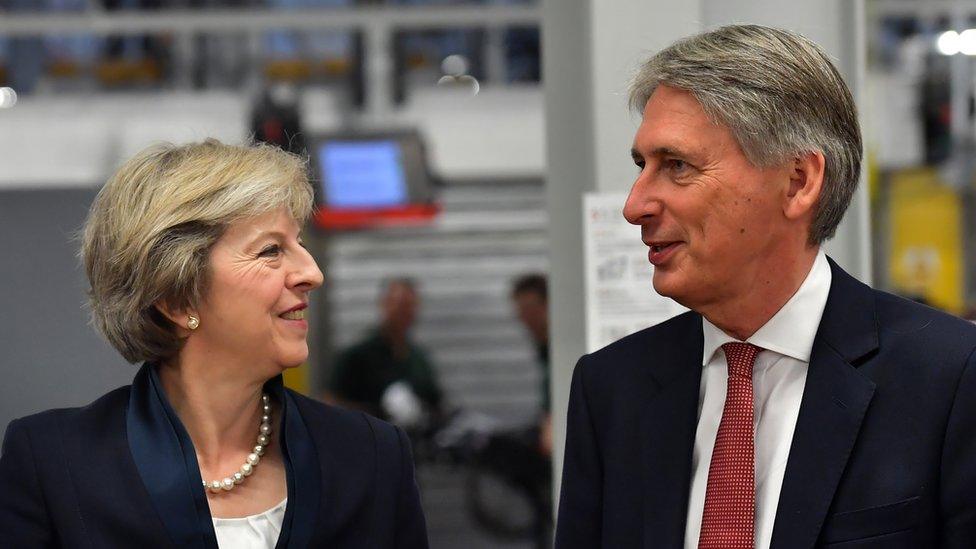
Downing Street says it has "full confidence" in Chancellor Phillip Hammond
So, a bare 15 weeks after appointing him, Mrs May has had to express, in that deathly phrase, "full confidence" in Phillip Hammond. This followed newspaper stories that he was on the brink of resignation. This speaks volumes.
Remember that, while the cabinet are "are all Brexiters now", these two both backed Remain. Perhaps that was for tactical reasons of internal party political advantage but, if we assume a degree of integrity, then they are implementing what is in their view Plan B, doing something they warned would be difficult and dangerous.
Don't let their harsh dismissal of those who, like them, backed Remain, disguise this. It is little wonder they are at loggerheads pondering the pitfalls of making the best of a bad job.
In this they are at least united, ranged against those, like Liam Fox and David Davis, who have no doubts. Ironically, their instincts in some areas may be closer to Mr Cameron's view than Mrs May's.
For years they have thought about the details of leaving, and have solid plans, which may not accord with the prime minister's enigmatic approach to negotiations.

An aging population is one of the broader problems faced by the government
These are the obvious fault lines for a fragile government. It does not mean that there are not others, arguably far more important.
Any government of any colour, without an instruction to leave the European Union, would still be facing some immense challenges.
The crisis an aging population is causing in pensions and social care, the ever-rising cost, and demand for the services, of the NHS, the problems of productivity and inequality and environmental change.
There are also those wonderful opportunities and hideous dangers produced by advances in Artificial Intelligence and gene editing, which politicians hardly talk about,, external let alone face with coherent alternative policies.
All of these may see politicians ranged along battle lines that are very different to the trenches of the past.
It is easy for those us trained in the ways of Westminster to see this as an acute headache for the whips.
But in truth, such odd and intricate fissures in the body politic is a problem for all of us, when the deeply ingrained instinct is to put problems of party management ahead of the national interest.
- Published14 July 2016
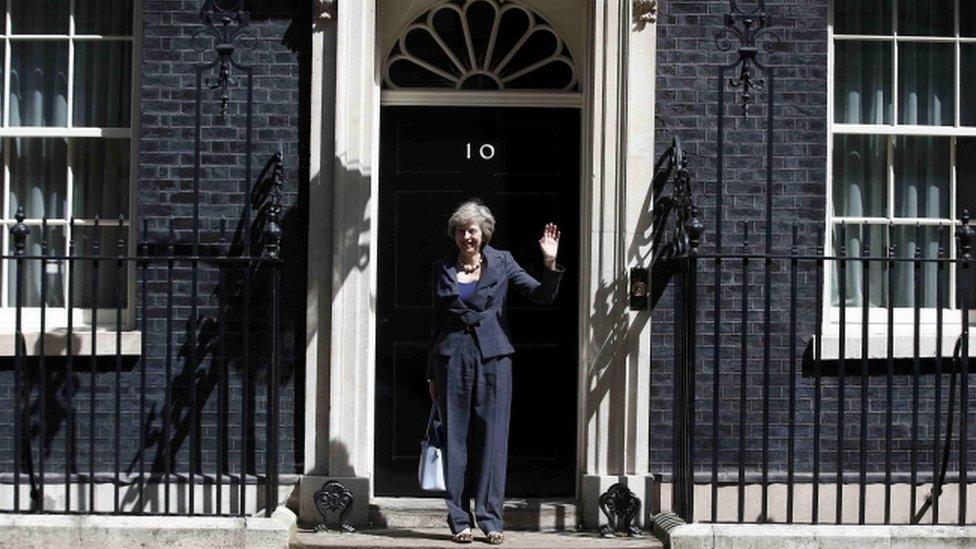
- Published30 December 2020

- Published26 October 2016

